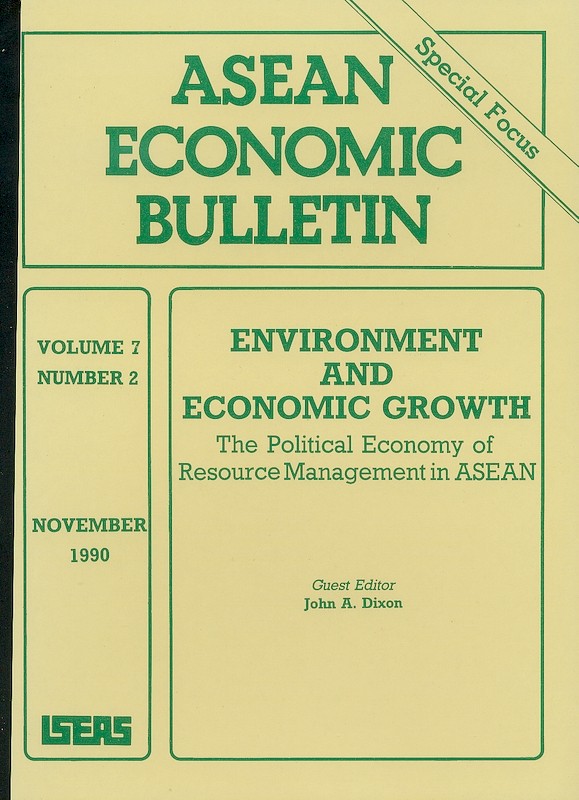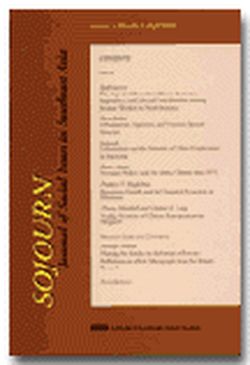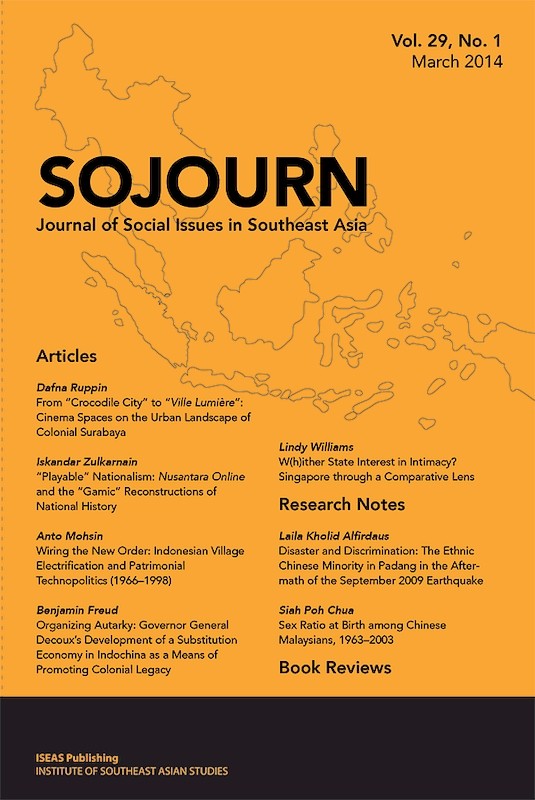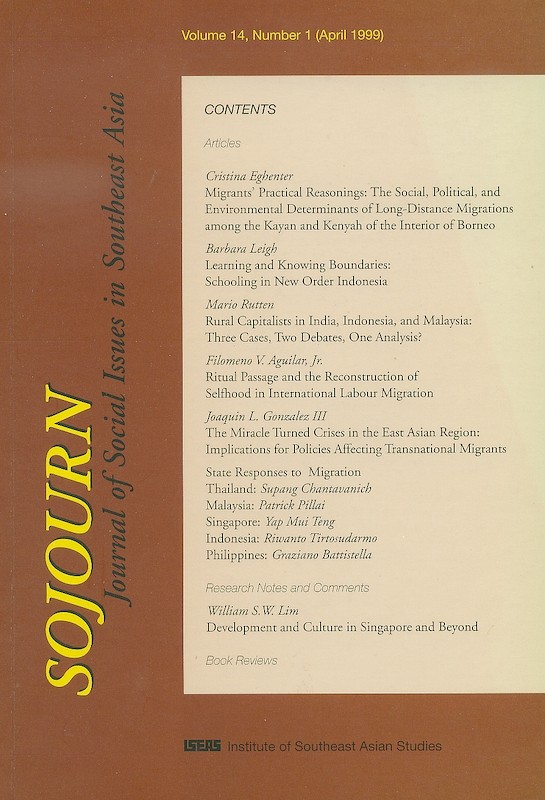SOJOURN: Journal of Social Issues in Southeast Asia Vol. 6/1 (February 1991)
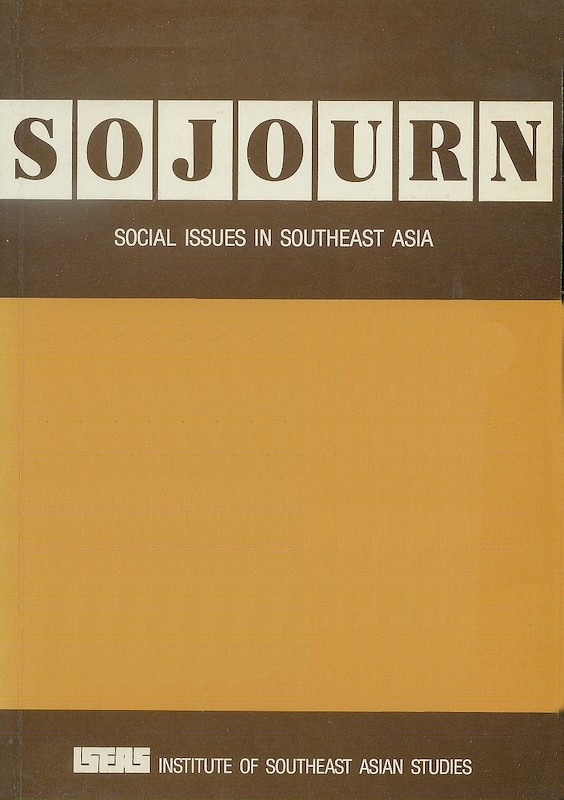
Date of publication:
February 1991
Publisher:
Institute of Southeast Asian Studies
Number of pages:
172
Code:
SJ6/1
Contents
-
Preliminary pages
- ARTICLES
-
Trade as Off-Farm Employment in Central Java, by Hans-Dieter Evers, author see abstractDuring the past two decades off-farm and other non-agricultural employment has increased rapidly in rural Java mainly due to an increase in female employment in petty trade. After a discussion of various definitions and hypotheses on the growth of off-farm employment and trade it is concluded that the growth in petty trade is not a sign of economic stagnation or agricultural involution but rather a crucial step in the transformation of Javanese peasant society and the future development of the Indonesian economy. This conclusion is supported by results of a large-scale survey on off-farm employment in the district of Jatinom, Central Java. Eighty-one per cent of all traders are women, of whom two-thirds are engaged in trade as off-farm employment.
-
Demographic and Cultural Constraints on the Comprehensive Agrarian Reform Program in the Philippines, by Chester L Hunt, author see abstractThe Comprehensive Agrarian Reform Program, CARP, is the latest of several land reform programmes to be enacted in the Philippines. As with previous plans, CARP is based on the theory that traditional market mechanisms can be replaced by bureaucratic entities. CARP is also constrained by population growth, which has made it impossible for the majority of peasants to get adequate-sized farms under any system. The only realistic hope for rural improvement lies in industrialization and population limitation. Political pressures towards land reform are irresistible, but such measures will do less harm and offer more benefit if they utilize market forces and traditional structures.
-
Cultural Mediation and the Limits to "Ideological Domination": The Mass Media and Ideological Representation in Thailand, by Ubonrat Siriyuvasak, author see abstractThe aim of the paper is to demonstrate the shortcomings of the "dominant ideology thesis" with regard to the role of the mass media and ideological transmission. It is argued that there is a mediated and dialectical relation between the mode of production and signification. Central to the question of ideological representation are the "relative autonomy" of the professionals and artists and the "active role" of the audience. In addition, there are contesting systems of ideologies and cultures which create tensions and resistances. The real problematic is the structures and processes of the mass media, constrained by the dynamics of the economy and the power structure, in which the constituents of social stratification are represented, reproduced, and challenged.
-
Population Mobility in Java: In Search of Theoretical Explanation, by Tommy Firman, author see abstractThis paper begins with a critique of studies of population mobility in Indonesia. Descriptive studies focus on population mobility in a predominantly static manner, whereas structural research which considers the broad political and socioeconomic forces affecting population mobility oversimplifies the socioeconomic conditions of Indonesian society and tends to neglect local conditions which are none the less important. What is needed is an understanding of the ways in which broad contextual forces shape population mobility and, in turn, the extent to which that movement affects such forces. In this light, this paper attempts to construct a framework of analysis that can identify the interaction between macro socioeconomic processes and population mobility in Java. Within this framework, it examines the links between rural households, labour flows, and the housing construction industry in Bandung, West Java.
-
Living on the Rim: Ecology and Forest Monks in Northeast Thailand, by Jim Taylor, author see abstractWith the rapidly disappearing primary forests in Thailand's Lao-speaking provinces, some reclusive forest monks have been teaching villagers practical, moral, and environmentally friendly strategies for survival. Historically, the extension of "Thai-isation", and an urbanized vision of progress and development, led to the unbridled clearing of these potentially hostile, "patternless" places. It is here, on the rim of social order, that ascetic monks have long wandered and eventually settled in peaceful coexistence with nature. Aware of the consequences of deforestation to the wider community and to their own tradition, the forest monastery and its monastic inmates have become in recent years a vital means of protecting the remaining frontier forests. This paper looks firstly at the cosmological, social, and political implications of forest monks, the state, and the environment; and secondly, a case-study of how one forest monk addressed these problems, constructed around orthodox Buddhist teachings.
- RESEARCH NOTES AND COMMENTS
-
The Role of the Chinese in Vietnam's Economy, by Tran Khanh, author see abstractThis paper reports on work in progress on a study of the Chinese in Vietnam. It surveys existing studies on the Chinese in Vietnam and their role in the Vietnamese economy before 1975 and after 1975, and also describes some key issues, which the study seeks to focus on, especially in the post-1975 period and in the light of recent policies on "renovation" in Vietnam
-
The Payap University Archives: A Resource for the Study of Thailand, by Hebert R Swanson, author see abstractThis note provides an introduction to the holdings of the Payap University Archives, Chiang Mai, Thailand, and describes research subjects contained in those holdings. The note provides advice for potential users of the archives and details concerning the hours when the archives is open and restrictions on the use of certain collections.
- BOOK REVIEWS
-
BOOK REVIEW: Phadaeng Nang Ai: A Translation of a Thai-Isan Folk Epic in in Verse. Translated and edited by Wajuppa Tossa., by Grant Evans, author
-
BOOK REVIEW: Nomades et Sedentarisation a Borneo: Histoire Economique et Sociale. By Bernard Sellato., by Roxana Waterson, author
-
BOOK REVIEW: The Political Economy of Primary Health Care in Southeast Asia. Edited by Paul Cohen and John Purcal., by Trinidad Osteria, author
-
CONFERENCES, WORKSHOPS, AND SEMINARS

